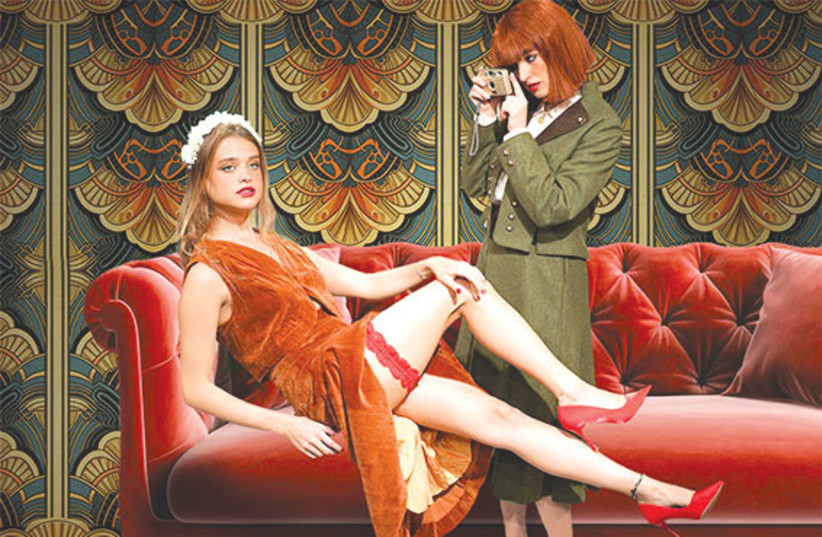Fashion rage was the heart of Rainer Fassbinder’s 1972 German film The Bitter Tears Of Petra Von Kant. The same chic craze pumped a new pulse into Yoram Loewenstein’s Actors Studio revival of the original stage version, now playing in Tel Aviv.
Daniel Gimpel shines as Petra von Kant, a divorced fashion designer who exiled her daughter, Gaby (Noa Vatner), to a boarding school and has an uneasy relationship with her mother Valerie (Anna Benjamin).
Petra shares her life with silent, subservient Marlene (Tali Kusner). Into this glamorous life, where lives and fortunes hinge on the success of one’s latest design, enters Karin Thimm (Sharon Strimban). Karin's role alternates between Strimban and another young actress, Adi Zemah. Petra offers to make Karin a world-famous model if she moves in with her and loves her. This dangerous triangle, with its unhealthy mix of wealth and status, sex and control, crashes as a horrified friend of Petra, Sidonie von Grasenabb (Tamar Kornblum), looks on.
This is an achingly beautiful production. The moon shines at the night sky video hung by designer Aviv Abramovich at Petra’s window, and the precise costumes designed by Hava Levy Rozalsky are the latest dernier cri.
When Kusner walks in as Marlene, we register her odd situation of formality and fragility in a single glance. Her formal suit, exposed chest, and black bob wig solidify her non-speaking role into a terrific performance offered by this young actress.

One dance
One dance scene in particular, during which she is held by Petra and offers the audience her delighted, surprised face, was etched into the memory of those who witnessed it.
Gimpel, in the lead role, deserves praise for a brave, emotionally robust depiction of a deeply flawed human being. Her Petra is beautiful, hideous, pathetic, and heartbreaking. “It is easy to pity,” Petra tells Sidonie: “to understand is much more complicated.”
The mannequins placed on stage by set designer Dafna Perez serve multiple purposes. They carry the clothes the actresses put on but also symbolize the narcissistic pain in Petra’s rage. When Karin enters her life, Petra sees in her the potential of forming another woman from scratch to serve as her mirror. But Marlene’s ability to fill this need in Petra’s life is limited. She is mute; Karin speaks.
KARIN’S PERSONALITY whips her would-be female Pygmalion, Petra, into a humiliating submission. She is willing to take dictation for Karin, to buy her airline tickets, to build her as a fashion icon – if only her voice mirrors Petra’s desire back without smears or cracks.
Karin, however, is unable to serve as a living mannequin, to be a speaking Galatea to Petra. This is why Karin torments her with lewd tales of how she stepped out with men, which makes Petra feel as if she is not enough.
When Karin finally does tell Petra that she loves her, it is only in a narcissistic context. After seeing herself on the cover of a glossy fashion magazine, she informs Petra, who made it possible, of her love for her. But it is merely self-adoration reflected to a benefactor, not a desire to lose one’s ego to form a union with another soul.
Without love, what is left? Money is one answer – and Petra makes Karin crawl on all fours to get some. Food is another; this can be seen when the excellent Noa Vatner, as Gaby, devours a cake with her bare fingers at the home of her unfeeling mother.
The action is repeated when Petra, drunk and filled with self-hate, does it too – showing us how families pass along unhealthy attitudes despite the best of intentions.
Set in a stylized stage depiction of the past century, when people typed letters, played records, and called travel agents via landlines – the music of Nina Simone offers the final touch to make this production an outstanding achievement.
The Bitter Tears of Petra von Kant, translated into Hebrew from German by Niko Nitai and co-directed by Lilach Segal and Yoram Loewenstein, is offered at the Yoram Loewenstein Acting Studio on Wednesday and Thursday, February 21 and 22, at 8:30 p.m., and Friday, February 23, at noon. All performances will be held at 19 Hanoch St. Tel Aviv. Hebrew only. Different studio students play roles in alternating performances. 90 minutes without intermission. NIS 65 per ticket. Call (03) 688-6514 ext.1 to book seats. The performance contains adult themes; not suitable to those under-age.
